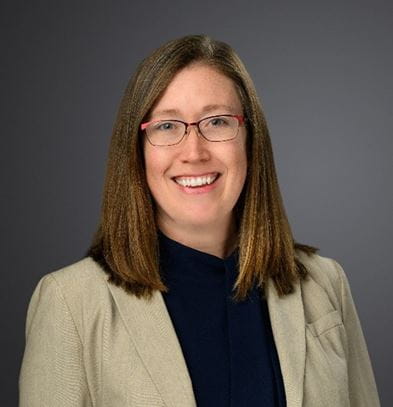Learning new habits empowered Kimberley Emberg to better serve her community

Kimberley Emberg, at her core, is a problem solver. As a client experience manager at Wipfli, she spends her days resolving questions with risk advisory services clients. helping her colleagues with technology issues and generally making sure the workflow on her team proceeds as seamlessly as possible. “My job is to make everyone else’s job easier,” she said.
Her “off” hours can be just as consuming. Since 2020, she’s served as a member of the Board of Selectmen, the main governing body in her town, Kingston, Massachusetts, a coastal community of 14,000 residents south of Boston. She won her seat following a period of upheaval on the board, which included the recall of two members for alleged malfeasance and the replacement of a third on the five-member board office. “A lack of transparency, a lack of communication and a lack of coordination are what inspired me to run for office,” she said.
Kimberley’s victory helped bring needed stability to the board as she aimed to rebuild trust with the public and fellow town officials.
Vexing budget challenges
The honeymoon period didn’t last long, however. Her board was responsible for drafting the budgets for all town services, which inevitably came with pushback from various municipal departments. The biggest “tug of war,” she discovered, was with the school system, whose share of local spending now accounts for more than half of the $60 million annual budget. In recent years, school costs have been ballooning beyond what the town could garner from additional taxes.

Tackling thorny budget issues on behalf of her town.
And 2025 looked to be “the hardest budget we’d have to bring forth in the five years I’ve served,” Kimberley said. “Based on what I could see, we’d probably have to make some difficult cuts.”
Kimberley’s decision last fall to enroll in one of Wipfli’s flagship leadership development courses, “The 7 Habits of Highly Effective People,” fortuitously gave her insights and a fresh perspective that brought her problem-solving skills to a whole new level.
She could hardly have imagined at the outset how the 14-week course with 25 Wipfli colleagues would help her dramatically change her approach to working with her fellow local officials, which led to, as some in her community described it, “saving our town.”
Getting to ‘win-win’
“Year after year, when we built the budget, we consistently found ourselves in a win-lose mindset, arguing over how to spend the money: the Board of Selectmen on one side, and the School Committee on the other. We would find ourselves in constant disagreement with an “us versus them” mentality,” she said.
The 7 Habits class helped her develop a new mindset that inspired her to find a more open and collaborative way of working with the school leaders. She reached out to one school committee member to discuss how they could find a more productive way of working together. It started with creating a shared spreadsheet so they could reconcile the budget numbers the board was using with those of the school committee. “Together, we found clerical errors and discovered several areas where the budget could be adjusted to maintain staffing levels while lowering the overall budget by more than $300,000. It saved us from having to go through a complicated ballot process, which, if passed, would have permanently increased the tax levy.”
Kimberley is grateful to Wipfli for providing her with the opportunity to participate in 7 Habits, convinced she would not have achieved the results they did for their community without it. “I continue to use the skills from the course each day — at work, at home and in my community on our Board of Selectmen. I cannot say enough good things about it,” she said.
Her success with the program has led to a new opportunity to support Wipfli colleagues. She is currently serving as an ambassador for other associates going through the course. “As I mentor them through 7 Habits, I’m excited to see them develop, apply the habits and shift their perspectives.”


